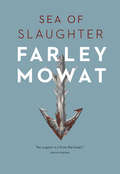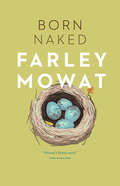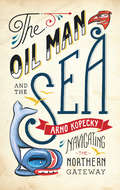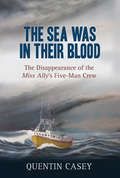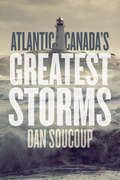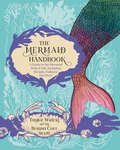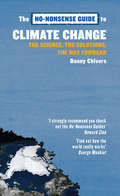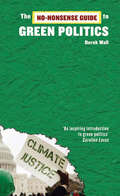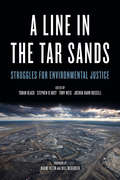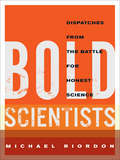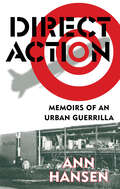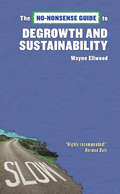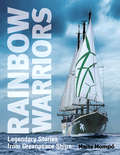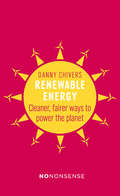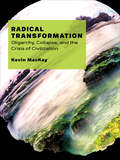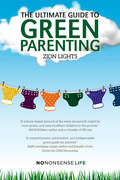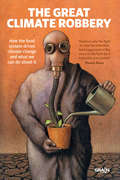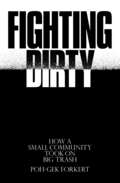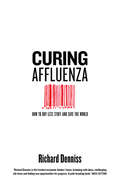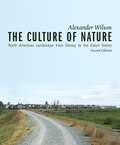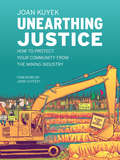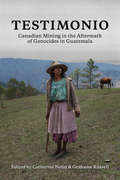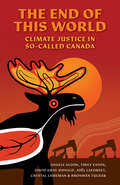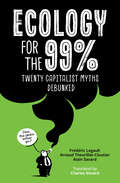- Table View
- List View
Sea of Slaughter
by Farley MowatThe northeastern seaboard of North America, extending from Labrador to Cape Cod, was the first region of North America to suffer from human exploitation. <P><P>Farley Mowat informs the extensive historical and biological research with his direct experience living in and observing this region. When it was first published nearly thirty years ago, Sea of Slaughter served as a catalyst for environment reform, raising awareness of the decline and destruction of marine and coastal species. Today, it remains a prescient and chilling environmental classic, serving, now as ever, as a haunting reminder of the impact of human interest on the natural world.
Born Naked
by Farley MowatFarley Mowat's outrageous memoir begins with his unlikely conception in a canoe and continues to his boyhood fascination with creatures of the natural world and on to his youthful rambles and adventures. To his immense pleasure and his parents' dismay, he adopted various beasts (whom he affectionately calls "The Others") as roomates. In this boyhood memoir, he recounts the exploits of this second family, who have been the subjects of many of his beloved books for young readers. This is the tale of a mischievous, immensely gifted young naturalist, recounted with the wisdom, humour and grown-up perspective of a very talented writer.
Born Naked
by Farley MowatFarley Mowat's outrageous memoir begins with his unlikely conception in a canoe and continues to his boyhood fascination with creatures of the natural world and on to his youthful rambles and adventures. To his immense pleasure and his parents' dismay, he adopted various beasts (whom he affectionately calls "The Others") as roomates. In this boyhood memoir, he recounts the exploits of this second family, who have been the subjects of many of his beloved books for young readers. This is the tale of a mischievous, immensely gifted young naturalist, recounted with the wisdom, humour and grown-up perspective of a very talented writer.
The Oil Man and the Sea: Navigating the Northern Gateway
by Arno KopeckyA sailing trip along the proposed Northern Gateway marine route with a fresh new voice in non-fiction.With oil and gas behemoth Enbridge Inc.'s Northern Gateway proposal nearing approval, supertankers loaded with two million barrels of oil may soon be plying the waters from northern British Columbia down the wild Pacific Coast. <P><P>This region is home to the largest tract of temperate rainforest on earth, First Nations who have lived there for millennia, and some of the world's most biodiverse waters-one spill is all it will take to erase ten thousand years of evolution.Arno Kopecky and his companions travel aboard a forty-one-foot sailboat exploring the pristine route-a profoundly volatile marine environment that registered 1,275 marine vessel incidents-mechanical failures, collisions, explosions, groundings, and sinkings-between 1999 and 2009 alone. Neither Kopecky nor the boat's owner have ever sailed before, yet they brave these waters alone when their captain leaves them part way through the journey.Written with Kopecky's quick humor and deft touch, this is a rich evocation of a mythic place and the ecology, culture, and history of a legendary region with a knife at its throat.
The Sea Was in Their Blood: The Disappearance of the Miss Ally's Five-Man Crew
by Quentin CaseyA journalist and maritime historian investigates the deadly 2013 storm that claimed the lives of five fishermen off the coast of eastern Canada. It was a frigid night in February 2013 when the five young fishermen vanished. The crew of the Miss Ally—a 12-metre Cape Islander from Woods Harbour, Nova Scotia—was fishing for halibut far off the Nova Scotia coast when their boat&’s spotlight malfunctioned. A vicious winter storm was approaching from her south, and all other boats at the fishing grounds were steaming for shore. Unable to locate his longlining gear, the Miss Ally&’s young captain decided to stay an extra day to retrieve the gear and, hopefully, a big catch. Their retreat delayed, the Miss Ally crew ended up pounded by hurricane-force winds and waves well over 10 meters high. Late on February 17, the boat foundered. The five young men aboard—Katlin Nickerson, Billy Jack Hatfield, Joel Hopkins, Cole Nickerson, and Tyson Townsend—were never found. The Sea Was in Their Blood explores two key questions: who were the men aboard the Miss Ally, and why were they battered and sunk by a storm forecasted days in advance? Through interviews with the crew&’s families and friends, rescue personnel, and members of the tight-knit fishing communities of Woods Harbour and Cape Sable Island, award-winning journalist Quentin Casey pieces together the tragic sinking—including important case details not previously reported—and weaves in the backstories of the Miss Ally&’s crew and the lingering effects of their disappearance. A portion of the royalties from the sale of this book will be donated to various charitable causes associated with the Miss Ally.
Atlantic Canada's Greatest Storms
by Dan SoucoupA fascinating exploration of the most dramatic storms along Canada&’s Atlantic coast, from 1745&’s Grand Armada Tragedy to the 2017 Ice Storm. Over the centuries, Canada&’s Atlantic coast has been battered by hurricanes and winter blizzards, struck by tornadoes, devastated by floods, and even hit by terrifying tsunamis. Now Dan Soucoup, a historian of Canada&’s Maritime Provinces, explores the region&’s most dramatic storms from the 18th century into the 21st in Atlantic Canada&’s Greatest Storms. Soucoup chronicles the North Atlantic&’s greatest hurricanes, including the 1775 Independence Hurricane, the Saxby Gale in 1869, and Hurricane Igor in 2010. He also recounts a terrifying series of blizzards in 1905, The Year of the Deep Snow, which left passenger trains stranded for days in the Annapolis Valley; as well as Newfoundland&’s 1929 tsunami, which devastated the Burin Peninsula, striking dozens of coastal communities and carrying people and homes out to sea. Features 25 black and white images.
The Mermaid Handbook: A Guide to the Mermaid Way of Life, Including Recipes, Folklore, and More
by Taylor Widrig Briana Corr Scott&“Contains profiles of mermaids from around the world complete with folklore about each maiden . . . a must-have if you are fascinated with mermaids.&” —BeachcombingThe book mermaids-in-training have been waiting for. From history and folklore to recipes and tips for ocean preservation, as well as profiles and original illustrations of mer-maidens from around the world, The Mermaids Handbook features everything you need to know to follow the mermaid way of life.]Over 40 healthy and accessible recipes, developed by author Taylor Widrig of Mermaid Fare, a Nova Scotia–based company specializing in wild and cultivated sea vegetables, include scrumptious starters like Mermaid Kaiso Seaweed Salad, new classics like Dulse, Lettuce, and Tomato Sandwich and Creamy Wakame Casserole, as well as healthy snacks like Smoothie Bowls and Energy Bites, and even homemade beauty products, such as the Coconut Sea Hair Mask—for that salty sea-hair.Includes an introduction by Dr. Alan Critchley with everything you&’ve ever wanted to know about seaweeds and original 2-colour illustrations by artist Briana Corr Scott (The Book of Selkie).&“Nova Scotia sea-vegetable advocate Taylor Widrig is hoping to lure a new generation into the depths with her debut book . . . Written in a conversational tone, Widrig&’s scientific explanations are fascinating and age appropriate.&” —Quill & Quire
No-Nonsense Guide to Climate Change: The Science, the Solutions, the Way Forward (No-Nonsense Guides #3)
by Danny ChiversJust as the need for action on climate change becomes more urgent and overwhelming, the campaign to deny that humans are causing it has gained more traction. This completely new book meets the skeptics head on, offering a guide to the science, an insight into the politics of climate justice and a clear sense of the way forward. This is an ideal offering for students, academics and anyone interested in the growing issue of society’s impact on climate change and how to make climate justice a reality.
No-Nonsense Guide to Green Politics (No-Nonsense Guides #13)
by Derek WallClimate chaos and pollution, deforestation and consumerism: the crisis facing human civilization is clear enough. But the response of politicians has been cowardly and inadequate, while environmental activists have tended to favour single-issue campaigns rather than electoral politics. The No-Nonsense Guide to Green Politics measures the rising tide of eco-activism and awareness and explains why this event heralds a new political era worldwide: in the near futurethere will be no other politics but green politics.
A Line in the Tar Sands: Struggles for Environmental Justice
by Black, Toban; D'Arcy, Stephen; Weis, Tony; Kahn Russell, Joshua; Klein, Naomi; McKibben, BillTar sands “development” comes with an enormous environmental and human cost. But tar sands opponents—fighting a powerful international industry—are likened to terrorists; government environmental scientists are muzzled; and public hearings are concealed and rushed. Yet, despite the formidable political and economic power behind the tar sands, many opponents are actively building international networks of resistance, challenging pipeline plans while resisting threats to Indigenous sovereignty and democratic participation. Featuring contributions from Winona LaDuke, Bill McKibben, Naomi Klein, Clayton Thomas-Muller, Harsha Walia, Jeremy Brecher, Crystal Lameman, Melina Laboucan-Massimo, Yves Engler, Cherri Foytlin, Macdonald Stainsby, Yudith Nieto, Greg Albo, Brian Tokar, Jesse Cardinal, Rex Weyler, Jess Worth, and many more. The editors’ proceeds from this book will be donated to frontline grassroots environmental justice groups and campaigns.
Bold Scientists: Dispatches from the Battle for Honest Science
by Michael RiordonAs governments and corporations scramble to pull the plug on research that proves that they are poisoning our planet and rush to muzzle the scientists who dare to share their disturbing data, it seems the powerful have declared a war on science. Michael Riordon asks deep questions of bold scientists who defy the status quo including: an Indigenous biologist who integrates traditional knowledge and a trickster’s wit; an engineering professor who exposes the myths and dangers of fracking; a forensic geneticist who traces children stolen by the military in El Salvador; a sociologist who investigates the lure and threat of mass surveillance; a radical psychologist who confronts psychiatry’s dangerous power; and a young marine biologist who risks her career to defend science and democracy. Who controls science and at what cost to the earth and its inhabitants? Can we change? This is unspun science for dangerous times.
Direct Action: Memoirs of an Urban Guerrilla
by Ann HansenAnn Hansen stood trial as one of the so-called “Squamish Five.” Sentenced to life in prison, she served seven years. Now she tells her story for the first time. Direct Action captures the excitement and indignation of the counterculture of the early ’80s. Missile tests were fuelling a new arms race. Reckless megaprojects threatened the global environment. Alienation, punk rock, and militancy were on the rise. Hansen and her fellow urban guerrillas believed that sabotaging government and corporate property could help turn things around. To prove their point, they bombed the Litton Systems plant in Toronto, where components for Cruise Missiles were being made. Hansen’s book poses unresolved ethical dilemmas. In light of the recent explosion of anti-globalization protests, Direct Action mirrors the resurgence of militant activity around the world.
No-Nonsense Guide to Degrowth and Sustainability
by Wayne EllwoodThe world’s addiction to economic growth continues with barely any recognition that this is a problem. Indeed, in a Western world currently dominated by austerity measures and ducking in and out of recession, growth is seen even by progressives as the only possible solution for our economic and social woes. This No-Nonsense Guide looks deeper into the idea of economic growth–to trace its history and understand why it has become so unchallengeable and powerful. And then it goes beyond that to present the alternative–how we can kick our dirty habit, how degrowth can be turned into a positive and how we can arrive at a new levels of environmental sustainability without having to turn the clock back to the Dark Ages.
Rainbow Warriors: Legendary Stories from Greenpeace Ships
by Maite MompóFollowing the lives of the three Greenpeace ships with the name Rainbow Warrior, long-serving Greenpeace activist, Maite Mompó tells the inside stories of life on board and recounts some of the ships’ most exciting adventures and actions. Rainbow Warriors provides a narrative of real life on board, a history of these famous vessels, and a history of Greenpeace that goes beyond the organization’s work on the oceans. Starting with the early life of Greenpeace and the bombing of the Rainbow Warrior I by the French secret service through to the imprisonment of the Arctic 30 by the Russians, the stories are brought to life with colour photos from the Greenpeace archives, maps, and nautical charts. Mompó’s tales from the high seas are full of action and daring but also of humanity and great compassion.
Renewable Energy: Cleaner, fairer ways to power the planet (No-Nonsense Guides #35)
by Danny ChiversFew people doubt the threat of climate change and the urgent need to conquer fossil fuel addiction. But can renewable sources of energy ever be sufficient to provide modern societies with a decent quality of life? This book is clear. They can. And it outlines the strategies to break the barriers to a 100% renewable world. Danny Chivers presents a compelling introduction to renewable technologies for non-technical readers (solar, wind, hydro, geothermal and ambient heat, wave and tidal, fuel crops, and energy from waste) and a roadmap to powering the world, not just sustainably, but democratically.
Radical Transformation: Oligarchy, Collapse, and the Crisis of Civilization
by Kevin MacKayRadical Transformation is a story about industrial civilization’s impending collapse, and about the possibilities of averting this fate. Human communities first emerged as egalitarian, democratic groups that existed in symbiotic relationship with their environments. Increasing complexity led to the emergence of oligarchy, in which societies became captive to the logic of domination, exploitation, and ecological destruction. The challenge facing us today is to build a movement that will radically transform civilization and once more align our evolutionary trajectory in the direction of democracy, equality, and ecological sustainability.
The Ultimate Guide to Green Parenting
by Zion LightsThe Ultimate Guide to Green Parenting is the first book of its kind. Journalist, science writer and mother Zion Lights has researched all those questions that beset new or expecting parents – not just about environmental issues but also on approaches to parenting. She focuses on the scientific evidence rather than on the latest fad or personal anecdote and the result is a book that will help you adjust your lifestyle in practical ways that work for you and your child. From birth to nutrition and from diapers to travel, advice based on research and evidence can guide the way. And the good news is that going green will not only help to save the planet and help to protect your child’s health, it will also result in a happier and more fulfilling family life.
The Great Climate Robbery: How the Food System Drives Climate Change and What We Can Do About It
by GRAINThe Great Climate Robbery connects analysis of the food system to larger issues affecting the planet, and link peoples’ struggles over food to climate change. This book will help readers to understand the ways in which corporations control the food system and provide the analysis needed to challenge this control.
Fighting Dirty: How a Small Community Took on Big Trash
by Poh-Gek ForkertFighting Dirty tells the story of how one small group of farmers, small-town residents, and Indigenous people fought the world’s largest waste disposal company to stop them from expanding a local dumpsite into a massive landfill. As one of the experts brought in to assess the impact the toxic waste would have on the community, Poh-Gek Forkert was part of the adventures and misadventures of their decades-long fight.
Curing Affluenza: How to Buy Less Stuff and Save the World
by Richard DennissAffluenza has not just changed the world, it has also changed the way we see the world. Short of money? Borrow some. Caught in the rain? Buy an umbrella. Thirsty? Buy a bottle of water and throw the bottle away. Our embrace of “convenience” and our acceptance of our inability to plan ahead is an entirely new way of thinking, and over the past seventy years we have built a new and different economic system to accommodate it. There is nothing inevitable about this current way of thinking, consuming, and producing. On the contrary, the vast majority of humans who have ever lived would find the idea of using our scarce resources to produce things that are designed to be thrown away absolutely senseless. The fact that our consumer culture is a recent innovation does not mean it will be easy to change. Indeed, the last few decades have shown how contagious affluenza can be. But we have not always lived this way, which proves that we don’t have to persist with it. We can change—if we want to.
The Culture of Nature: North American Landscape from Disney to Exxon Valdez
by Alexander WilsonSince it was first published in 1991, few books have come close to capturing the depth and breadth of Alexander Wilson’s innovative ecocultural compendium The Culture of Nature. His work was one of the first of its kind to investigate the ideology of the environment, to critique the future according to Disney, and illustrate that the ways we think, teach, talk about, and construct the natural world are as important a terrain as the land itself. Extensively illustrated and meticulously researched, this edition is exquisitely revised and reissued for the Anthropocene.
Unearthing Justice: How to Protect Your Community from the Mining Industry
by Joan KuyekThe mining industry continues to be at the forefront of colonial dispossession around the world. It controls information about its intrinsic costs and benefits, propagates myths about its contribution to the economy, shapes government policy and regulation, and deals ruthlessly with its opponents. Brimming with case studies, anecdotes, resources, and illustrations, Unearthing Justice exposes the mining process and its externalized impacts on the environment, Indigenous Peoples, communities, workers, and governments. But, most importantly, the book shows how people are fighting back. Whether it is to stop a mine before it starts, to get an abandoned mine cleaned up, to change laws and policy, or to mount a campaign to influence investors, Unearthing Justice is an essential handbook for anyone trying to protect the places and people they love.
Testimonio: Canadian Mining in the Aftermath of Genocides in Guatemala
by Catherine Nolin Grahame RussellWhat is land? A resource to be exploited? A commodity to be traded? A home to cherish? In Guatemala, a country still reeling from thirty-six years of US-backed state repression and genocides, dominant Canadian mining interests cash in on the transformation of land into “property,” while those responsible act with near-total impunity. Editors Catherine Nolin and Grahame Russell draw on over thirty years of community-based research and direct community support work in Guatemala to expose the ruthless state machinery that benefits the Canadian mining industry—a staggeringly profitable juggernaut of exploitation, sanctioned and supported every step of the way by the Canadian government. This edited collection calls on Canadians to hold our government and companies fully to account for their role in enabling and profiting from violence in Guatemala. The text stands apart in featuring a series of unflinching testimonios (testimonies) authored by Indigenous community leaders in Guatemala, as well as wide-ranging contributions from investigative journalists, scholars, lawyers, activists, and documentarians on the ground. As resources are ripped from the earth and communities and environments ripped apart, the act of standing in solidarity and bearing witness—rather than extracting knowledge—becomes more radical than ever.
The End of This World: Climate Justice in So-Called Canada
by Angele Alook Emily Eaton David Gray-Donald Joël Laforest Crystal Lameman Bronwen TuckerThe climate crisis is here, and the end of this world—a world built on land theft, resource extraction, and colonial genocide—is on the horizon. In this compelling roadmap to a livable future, Indigenous sovereignty and climate justice go hand in hand. Drawing on their work in Indigenous activism, the labour movement, youth climate campaigns, community-engaged scholarship, and independent journalism, the six authors challenge toothless proposals and false solutions to show that a just transition from fossil fuels cannot succeed without the dismantling of settler capitalism in Canada. Together, they envision a near future where oil and gas stay in the ground; where a caring economy provides social supports for all; where wealth is redistributed from the bloated billionaire class; and where stolen land is rightfully reclaimed under the jurisdiction and sovereignty of Indigenous peoples. Packed with clear-eyed analysis of both short- and long-term strategies for radical social change, The End of This World promises that the next world is within reach and worth fighting for.
Ecology for the 99%: Twenty Capitalist Myths Debunked
by Frédéric Legault Arnaud Theurillat-Cloutier Alain SavardIf everyone—from Emmanuel Macron to Jeff Bezos, and even Coca Cola—is green, why is the environmental crisis growing at an alarmingly rapid rate? The world is already experiencing the impact of climate crisis, but we are not equally responsible for its violent effects. Some of those who claim to be helping the planet are actually making things worse. To avoid being duped by false allies and to create an ecology for the 99%, we must discuss a radical topic: the exit from capitalism. Ecology for the 99% provides inspiration for building grassroots environmental movements through a lively discussion of the most persistent capitalist myths. It presents compelling evidence for why carbon market policies will fail, why a capitalist economy cannot be based on renewable energy sources, and why we should be protesting against overproduction, not overconsumption. Ecology for the 99% is an antidote to apathy and a bulwark against false leads. Time is running out, we can’t afford to take any wrong turns.
